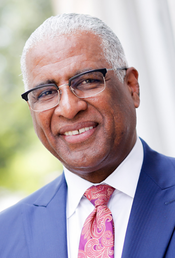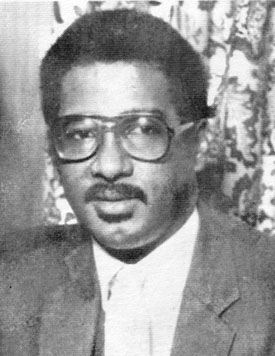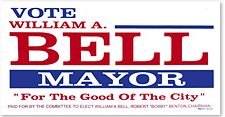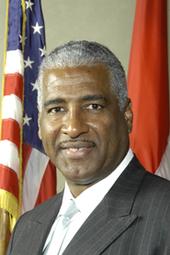William Bell
- This article is about the former Birmingham Mayor and Jefferson County Commission president. For other uses see William Bell (disambiguation).
William Anthony Bell Sr (born June 1, 1949 in Birmingham) is a former Mayor of Birmingham, serving from 2010 to 2017. He was a long-time Birmingham City Council representative and was appointed in 1999 to succeed Richard Arrington Jr as interim Mayor of Birmingham. After the 2009 conviction of Larry Langford, Bell won a runoff against attorney Patrick Cooper in a special election to serve the remainder of his term of office.
Bell is the grandson of a former ore miner and the son of D-Day veteran John W. Bell and Luvenia Little. He grew up in Titusville and was one of the first African American students to enroll at John Carroll Catholic High School in 1966. He graduated the following year and went on to earn a Master's degree in psychology and guidance counseling from UAB and a Juris Doctorate from Miles College.
Birmingham City Council
Bell, a marketing professional and former Xerox employee, was first elected to the at-large City Council in the 1979 election, earning a two-year term in the runoff after failing to win a seat in the 1977 Birmingham City Council election. In December of that year, his wife, Sharon was treated for injuries suffered in a what a police report described as a "domestic incident". Bell later accused the Birmingham Fraternal Order of Police of planting the story, then retracted the allegation when faced with a slander suit.
Bell used his first term in office to argue for more minority participation in city contracts. Frustrated by the 2-1 majority of white councilors which allowed them to act unilaterally as a block, he and fellow African-American Jeff Germany began complaining in the press of racial politics. In the 1981 election, he was the top vote-getter in the primary, but only finished fifth in a racially-charged run-off, earning another two years on the council. Bell was chairman of the City Council's Municipal Development Committee, charged with coordinating implementation of the Downtown Master Plan developed by Pedro Costa and Angelos Demetriou. Over the next few years, the Council debated whether to use condemnation as a redevelopment tool as a number of large-scale redevelopment proposals went unrealized. In 1982 Bell offhandedly referred to then Council President John Katopodis as a "Little Hitler", later apologizing for the remark.
Prior to the 1983 election, Bell demonstrated greater restraint, earning endorsements from both the Jefferson County Citizens Coalition and the mostly-white Voters of the Eastern Section. He was the top vote-getter and won a four-year term without a runoff in an election with heavy turnout. He was elected President Pro-Tem by the council after his swearing-in. In 1985 he blasted President David Herring for pushing through a $7 million bond issue without a recommendation from Bell's finance committee. The 1985 Birmingham City Council election gave the city its first majority-Black council, and Bell was elected President.
In 1987 Bell and Germany were investigated by the Alabama Public Service Commission for their roles as part-owners of Magic City Concessions, a company that had a 20% stake in Birmingham Turf Concessions, a vendor for and creditor to the Birmingham Turf Club, which was financed in part by the city. The case was referred to Attorney General Don Siegelman for possible prosecution, but the Commission later reversed its recommendation for insufficient evidence of a conflict of interest, since neither Bell nor Germany earned any income from their investments.
Meanwhile, despite the allegations, Bell and Germany both won re-election in the 1987 city council election and Bell remained President. In June 1988 Bell and Germany were again accused of conflicts of interest for their roles lobbying the Alabama State Legislature for a fuel tax exemption for Metro Area Express three years earlier. Later that same month County Commissioners Jim Gunter and John Katopodis relate that they had been asked by Bell and Germany to reopen a zoning decision without knowing that the pair were acting as paid lobbyists in the matter. In December Attorney General Siegelman and Jefferson County District Attorney David Barber announced that they would not prosecute Bell and Germany for their MAX dealings because the statute of limitations had expired before evidence came to light. Late in his fourth term, Bell began contacting area banks as part of his efforts to promote racial equality in hiring and lending across the city.
Following a lawsuit brought by Russell Yarbrough, the city voted in districts in the 1989 Birmingham City Council election. Prior to the election his day job as an administrative aide at UAB was the subject of questions from the media. Reportedly his position consisted mainly of tracking items in the Alabama State Legislature for the benefit of university administrators. His flashy clothes and expensive cars belied the modest income he reported from the university and the city. Nevertheless Bell easily won the right to represent Birmingham City Council District 5 with 79% of the vote. Eddie Blankenship, however, took over as Council President after the new body was seated, signalling Bell's loss of favor with the Jefferson County Citizens Coalition.
In 1990 Bell's sharp tongue returned him to the headlines when he challenged Birmingham's support for the 1990 PGA Tournament being hosted at the segregated Shoal Creek Golf Club in Shelby County. Club founder Hall Thompson made racially incendiary replies to the controversy. Mayor Arrington and other leaders entered into negotiations to defuse the situation, resulting in an invitation for Louis Willie to join Shoal Creek.
In 1993 Bell and Germany both had their wages garnisheed when Magic City Concessions defaulted on a $260,000 loan from First Commercial Bank. In that fall's election he won a sixth term on the Council. In 1994 Bell ran for the County Commission, but was disqualified because redistricting had left his house in College Hills outside the district in which he was running. In an attempt to satisfy the residency requirement, Bell rented a room at the Pickwick Hotel and then moved into Quinlan Castle. During the campaign, which he lost to Chris McNair, Bell fractured his leg in a scuffle with a private investigator who caught him mowing the yard at his regular residence. He lost his UAB position under a new vice-president that September.
Back on the council, Bell helped secure $300,000 in city funding to supplement pay for Birmingham City Schools faculty who supervise after-school activities. He declined to head up a special committee proposed by Blankenship to investigate minority hiring by contractors participating in Arrington's voluntary "Birmingham Plan". Later he accused Operation New Birmingham of ignoring the practice of racism in the corporate community.
In 1997 Bell petitioned the council to remove an existing limit on bingo jackpots. Jimmy Blake accused him of profiting from championing the issue. The Jefferson County Circuit Court overturned the ordinance for conflicts with state gambling laws. Bell defeated three challengers in the 1997 Birmingham City Council election, marked by low turnout. Following the election the Birmingham Board of Education released details of an audit showing possible financial improprieties originating with Bell's wife, Sharon, whose contract the Board had voted to terminate in August. She was later reinstated as a system administrator.
Bell himself returned to the position of Council President and immediately restructured the Council's committees, placing enormous power in a new Finance and Administration Committee, to which he appointed himself chair. He supported Mayor Arrington's plan for the city to sell the assets of the Birmingham Water Works to a private operator in order to retire the system's debts and establish a trust fund for capital education projects. Voters rejected the plan overwhelmingly in a November 1998 referendum. Three weeks later Bell introduced his own "Bell Plan" under which the city borrowed $185 million to retire the water system's debts, with the loan secured by future water revenues. The system's capital assets, in turn, were used to back a $200 million bond issue for school construction. The proposal was approved by the Council and the Chapman Company of Baltimore, Maryland, with former city attorney Donald Watkins as principal, was selected as one of the underwriters. Porter White & Company earned a fee for their work to restructure the water system's assets. Part of that fee was passed on the the Watters Group, headed by Edmond Watters, a former aide to Bell and later a partner with Watkins in Alamerica Bank.
Early in 1999, Bell took the initiative in pushing for a Fountain Heights revitalization plan that included the development of the Civil Rights District, which was supported by Arrington and Alabama Power CEO Elmer Harris.
Interim mayor
Bell served briefly as interim Mayor of Birmingham after the retirement of Richard Arrington in July 1999, and entered the 1999 Birmingham mayoral election as the front-runner. However his move to the mayor's office left Arrington's Jefferson County Citizens Coalition without a voting majority in the Council, opening the way for opposing voices in that chamber which made Bell seem ineffective.
Bell's mayoral campaign raised over $1 million, placing him far ahead of any other candidate. He won the most votes in the general election, but was forced into a primary with Bernard Kincaid, who had 27%. In a stunning rally, however, Kincaid bested Bell 51% to 49% in the runoff.
Return to the Council
Bell returned to the position of City Council President, where he was accused of actively disrupting the mayor's ability to perform his job. He subsequently lost his Council seat in the 2001 Birmingham City Council election to newcomer Elias Hendricks in a vote that was widely interpreted as supporting Kincaid over the incumbent council.
Bell ran for mayor in 2003, finishing in third place behind Kincaid and Carole Smitherman. Remaining debts from that campaign were at the heart of a lawsuit won in 2006 by Bill Attaway, who collected settlement payments from Bell through August 2011.
Bell successfully challenged Hendricks for the District 5 Council seat in the 2005 Birmingham City Council election and returned to the council in the role of "elder statesman", keeping his opinions to himself except to make procedural points or to plea for more unity and decorum. A much-remembered exception occurred in 2006 when he addressed fellow Councilor Roderick Royal as a "little twerp."
Bell served on the Council's Transportation and Communication Committee and the Public Safety Committee. He claimed the following accomplishments in his official biography:
- Intstrumental in implementing the council consent agenda for expediting approval of non-controversial initiatives.
- Assisted in funding development of a fitness track and mini-park at Legion Field.
- Responsible for Park Place, the first Hope VI project in downtown Birmingham.
- Generated more than $197 million for Birmingham schools and $87 million for UAB capital improvements through the "Bell Plan".
Bell put his name in as a candidate for the 2007 Birmingham mayoral election, and earned endorsements from the Fraternal Order of Police Birmingham Lodge No. 1 and the Firefighters Association Local 117. He finished fourth in the 10-candidate field, recording 3,505 of the 52,111 votes cast (6.73%).
County Commission
Saying that his only opportunities remaining in the City Council were to serve as an "almanac", Bell decided to seek new challenges and opportunities by running for the Jefferson County Commission seat vacated by new Mayor Larry Langford. He pledged to work for senior citizens services and to protect Cooper Green Mercy Hospital from possible sale. He also said he hopes to win more regional support for transit improvements and will be able to work with the Republican majority on the Commission. He won the special election with an outright majority of votes and planned to take office as soon as the count was certified, regardless of the actions by Governor Bob Riley to fill the post by appointment. Riley's appointment of George Bowman was, however, upheld by the courts.
Bell ran for the seat again in the 2008 general election. He ran unopposed as Bowman did not secure enough signatures on a petition to appear on the ballot. He was sworn in on November 12, 2008. Under a reorganization plan drafted by Commission president Bettye Fine Collins and approved by the commission, Bell became president pro-tem and took over some committees formerly overseen by Jim Carns. Bell's vacant City Council seat was filled by appointee Johnathan Austin.
Mayor
After the criminal conviction of Larry Langford, Bell placed his name in the hat for the special election to serve the last two years of Langford's term. When announcing his intention to leave the County Commission, he told the press that his heart was with the city and that the city needed him. Langford endorsed his candidacy.
In the primary, Bell garnered 26% of the votes, finishing second to Patrick Cooper and proceeded to a January 19, 2010 runoff, which he won with 25,354 (54%) of 47,333 votes. After the vote was certified, Bell took office on January 26.
Bell appointed Chuck Faush as his chief of staff and Jarvis Patton as chief of operations. His primary responsibility for his first months in office was to address the deficit which resulted from lower-than-projected revenues and numerous accounting irregularities in the 2010 Birmingham budget. In drafting a 2011 budget to account for more realistic projections, Bell proposed a city-wide 10% pay cut, the closure of several Birmingham Public Library branches and recreation centers, and other measures. After negotiations with the Birmingham City Council and various departments, other cost-saving proposals were made and using savings from the general fund to offset the deficit was debated. At mid-year, Bell reported that new projections showed that the measures taken had succeeded in producing a $9 million surplus, which he proposed to use to reinstate a 1.75% pay raise for city employees.
After his first year in office, Bell was praised for fostering a spirit of trust and optimism in the city and for his willingness to work toward regional goals. On the other hand, neighborhood leaders remained critical of the lack of specific programs for revitalization outside of the downtown and Fair Park projects and City Councilors criticized him for his high-handedness and for not sharing more information in the early stages of initiatives.
In the run-up to the 2011 Birmingham mayoral election, Bell congratulated his administration for its accomplishments, saying "I think the greatest work is still ahead of us, and I don't know anyone who has the talent, skills and compassion as much as I do to make those things happen." He won re-election over a slate of much lesser-known challengers with 89% of the vote and was sworn in for a new term on September 20.
Over his next two-year term, Bell witnessed a growing excitement about the downtown area and activity in the Avondale and Eastwood commercial districts. His relationship with the City Council continued to sour, especially in the process of approving a 2014 Birmingham budget, which reached an impasse. As a candidate for re-election in the 2013 Birmingham municipal elections, Bell touted his experience and effectiveness, and promised to leverage bond funding approved in October to pursue implementation of neighborhood development strategies outlined in the updated Birmingham Comprehensive Plan.
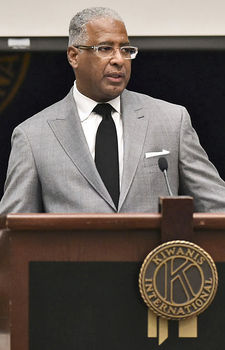
On December 15, 2015 Bell and Birmingham City Council member Marcus Lundy were involved in a physical altercation at City Hall. In Spring 2016 the Alabama State Legislature amended the Mayor-Council Act to give the mayor additional power over city budgets, departments, and appointments to public boards and authorities. The change was opposed by most of the Birmingham City Council, which lost power in the move.
In the 2017 Birmingham municipal election challenger Randall Woodfin forced Bell into a runoff, and then defeated him by a 59% to 41% margin. In 2018 the Alabama Ethics Commission, investigating a complaint filed by Iva Williams, found evidence that Bell violated state law when he convened a mandatory staff meeting in September 2016, in which he advised city workers to, "reach out to citizens," and "do your job professionally," if they wanted to help keep him in office and preserve their jobs. Bell characterized the meeting as informing employees who had expressed a desire to help him about what was allowed and not allowed. The case, in which Bell cooperated, was turned over to the Jefferson County District Attorney, which resolved the matter administratively.
After leaving office, Bell has worked with Al Gore's Climate Reality Project. In 2018 he founded the W. A. Bell Sr Foundation for Human and Civil Rights.
Bell was one of seven who challenged Woodfin's re-election bid in the 2021 Birmingham municipal election. He finished third, behind Woodfin and Lashunda Scales, with only 9.1% of the vote.
Outside politics
Bell was a founding member of the Birmingham Construction Industry Authority and 100 Black Men, a mentoring group. He has served on the boards for the National League of Cities and the Metropolitan Adversity Coalition. His other memberships include the Kappa Alpha Psi fraternity, the Birmingham Retired Teachers Association, and Operation New Birmingham.
Bell is married to the former Sharon Carson and has two children William Jr "Tony", and Jillian, both graduates of Ramsay High School and the University of Alabama. He is a member of Our Lady of Fatima Catholic Church and also sings in Sixth Avenue Baptist Church's Men of Distinction Male Chorus.
| Preceded by: (at large) |
Birmingham City Council 1979 - 1989 |
Succeeded by: (at large) |
| Preceded by: (at large) |
Birmingham City Council District 5 1989 - 2001 |
Succeeded by: Elias Hendricks |
| Preceded by: Eddie Blankenship |
Birmingham City Council President 1997 - 2001 |
Succeeded by: Lee Loder |
| Preceded by: Richard Arrington |
Mayor of Birmingham (interim) 1999 |
Succeeded by: Bernard Kincaid |
| Preceded by: Elias Hendricks |
Birmingham City Council District 5 2005 - 2008 |
Succeeded by: Johnathan Austin |
| Preceded by: George Bowman |
Jefferson County Commission District 1 2008 - 2010 |
Succeeded by: George Bowman |
| Preceded by: Roderick Royal (acting) |
Mayor of Birmingham 2010-2017 |
Succeeded by: Randall Woodfin |
References
- Kelly, Mark (September 30, 1999) "William Bell: The Historical Perspective" Black & White
- Bryant, Joseph D. (June 17, 2007) "Bell announces he'll run for mayor." The Birmingham News
- Bryant, Joseph D. (September 2, 2007) "Hopefuls have just weeks to win votes." The Birmingham News
- Bryant, Joseph D. (September 19, 2007) "Bell advances new image in 3rd run for mayor." The Birmingham News
- Bryant, Joseph D. (September 27, 2007) "Bell accused of shirking old debt." The Birmingham News
- Bryant, Joseph D. (January 29, 2008) "Bell touts his experience in seeking Jeffco commission seat." The Birmingham News
- Wright, Barnett (February 6, 2008) "Birmingham City Councilman William Bell elected to Jefferson County Commission District 1 seat." The Birmingham News
- Bryant, Joseph D. (November 12, 2008) "Bell, weighing legacy, moves from council to commission." The Birmingham News
- Wright, Barnett (November 24, 2009) "Birmingham mayor's race: 'My city needs me,' says Jefferson County Commissioner William Bell." The Birmingham News
- Natta, André (January 19, 2010) "Bell wins Birmingham mayoral runoff, serves until 2011" The Terminal
- Bryant, Joseph D. (January 21, 2010) "Bell to assume role as Birmingham mayor Tuesday." The Birmingham News
- Dean, Chuck (January 24, 2010) "For William Bell, a long journey to mayor of Birmingham." The Birmingham News
- Bryant, Joseph D. (January 26, 2010) "William Bell becomes mayor of Birmingham." The Birmingham News
- Bryant, Joseph D. (January 23, 2011) "High marks for Birmingham mayor Bell's first year." The Birmingham News
- Bryant, Joseph D. (June 20, 2011) "William Bell's only hat in ring for Birmingham mayoral election so far." The Birmingham News
- Kelly, Mark (July 31, 2013) "Bell's liberties." Weld for Birmingham
- Bryant, Joseph D. (August 23, 2013) "William Bell: Birmingham incumbent mayor touts downtown development, promises neighborhood focus next term." The Birmingham News
- Gray, Jeremy (December 15, 2015) "Birmingham mayor William Bell involved in altercation with councilman Marcus Lundy." The Birmingham News
- Wright, Barnett (May 17, 2016) "The problems of power for William A. Bell, Sr." The Birmingham Times
- Owens, Cody (June 8, 2017) "The Mayor and Your Money." Weld for Birmingham
- Edgemon, Erin (August 1, 2018) "Former Birmingham Mayor Bell violated minor ethics law, commission says." The Birmingham News
- Johnson, Roy S. (August 25, 2021) "Don’t yet put a period on William A. Bell Sr.’s legacy." The Birmingham News
External links
- Bell's council bio at birminghamal.gov
- William Bell for Mayor website
- William Bell for Mayor on MySpace.com
- Bell's responses to a Birmingham News questionnaire for the 2007 mayoral election
